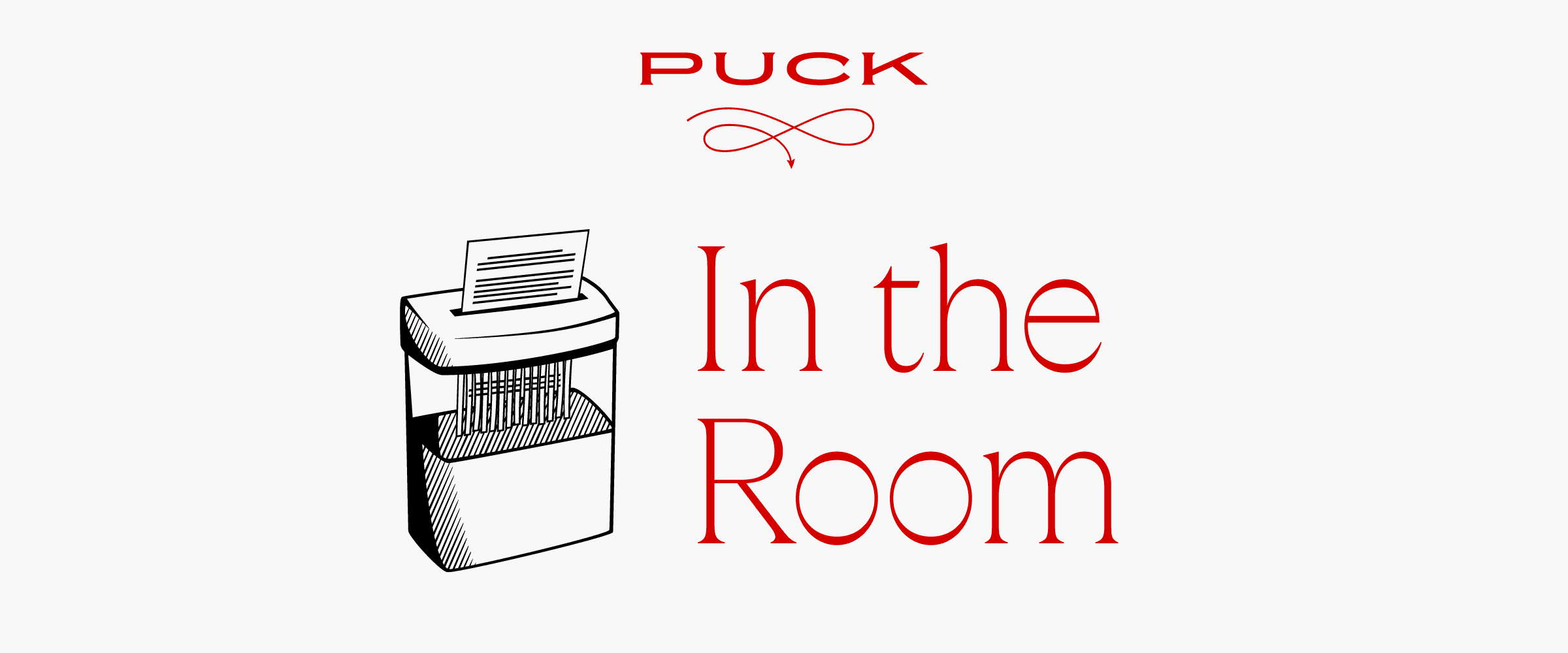 |
|
Greetings from Los Angeles, and welcome back to In the Room. In tonight’s email, news and notes on Will Lewis’s ongoing Post drama, Mark Thompson’s impending layoffs, and the highly anticipated CNN presidential debate—a rare chance for the beleaguered news network to transcend its slide into irrelevance, if only for a night.
🎟️ Programming note: On July 10 in D.C., Peter Hamby will moderate an exclusive, data-driven panel discussion in partnership with Echelon Insights, focused on surprising election trends leading up to November and the outsize impact of women voters over the age of 50. Puck members can click here to attend. Otherwise, click here to subscribe and email Fritz@puck.news for registration information.
But first…
💨 Politico’s prince: For well over a year now, Politico founding editor John Harris and his heir apparent Alex Burns have been trying to turn the once-scrappy and then long-complacent news outfit into a truly professional, world-class news organization, befitting their owner Axel Springer’s ambition of becoming the “leading digital publisher in democracies around the world.” The effort has met with considerable friction in the newsroom, causing some journalists to butt heads with management—most notably Burns, whom some view as an overbearing editor. Now, as Semafor reports, several journalists are heading toward the exit: Alex Ward and Lara Seligman (to The Wall Street Journal), Sam Stein (to The Bulwark), Burgess Everett (to Semafor), and Jack Shafer (to be determined).
The most notable losses here are Ward and Seligman, whose moves signal that Politico is not yet world-class enough to keep its promising young talent from defecting, which has always been a challenge for the organization. (On the flip side, the moves signal the Journal’s continued commitment to Washington coverage despite the recent shake-up of its D.C. bureau). As for the others, well, Harris only barely tried to hide his view that they weren’t the right fit for Politico’s new iteration: “I want people to find the right home for their work, even if sometimes it is elsewhere.” In any event, while some of these folks no doubt had very real gripes with leadership, they mostly seem to have been about creative control of the copy (and, apparently, a few instances last year in which Burns stealth-edited some of that copy). Ultimately, these intra-office squabbles don’t have much bearing on Politico’s ability to mature the business. As Harris notes, there are still 600 journalists there who haven’t left.
🤔 “Third Newsroom” History Lessons: I urge you to check out my partner Bill Cohan’s recent piece comparing Jeff Bezos and Will Lewis’s “third newsroom” with his own experience in the third investment bank—the Dickensian “corporate solutions group”—at the then-recently merged JPMorgan Chase two decades ago. “Just like the ‘corporate solutions group’ at JPMorgan Chase back in the day, the third newsroom concept appears ill-defined, rudderless, and nonsensical,” Bill writes. “And I imagine it may be abandoned as quickly as the old C.S.G. The Post is losing money hand over fist, even if its owner is the richest person in the world with a net worth of $216 billion these days, and therefore shouldn’t give a hoot about losing $100 million or so. But I guess caring about losing $100 million annually at your hobby is how you get to be worth more than $200 billion. If I were a journalist at the paper, I would do everything in my power to steer clear of it, even if the highly respected Matt Murray shifts over to run it after the election. (I have my doubts about this, too, to be honest.)” Make sure you never miss Bill’s work by signing up for Dry Powder here.
Speaking of the Post…
|
 |
| Wet Hot British Summer |
| News and notes on America’s two most-discussed British media executives: Mark Thompson, who is gearing up for Thursday’s debate; and Will Lewis, who is holding on for dear life on K Street. |
|
|
|
| On Thursday night, CNN will host the first, and perhaps only, presidential debate of the 2024 race—a program that seems all but destined to become the highest-rated 90 minutes in the network’s 44-year history. It’s a momentous Ali vs. Frazier political rematch that may change the course of the American presidential race, and thus the course of history. But it’s also a unique and pivotal opportunity for the beleaguered network to reestablish itself, if only for a night, as a relevant force in a culture that has largely grown ambivalent to it. In any event, a lot for CNN C.E.O. Mark Thompson and his deputies Virginia Moseley and Amy Entelis to chew on during their dinner tonight at the Four Seasons in Atlanta, just a few blocks east of the debate studio.
Without this debate, in fact, the network would be on track to register its lowest monthly audience since the end of the Cold War. It can no longer reasonably profess to be the place people turn to for breaking news, in part, because no such place exists. Meanwhile, Thompson’s plan to usher in a robust post-linear future—a landscape where audiences habitually engage with CNN’s digital, mobile, and streaming platforms, and maybe even pay for it—remains nebulous. Thompson’s Times revival has given him profound street cred inside Hudson Yards, but his employees are increasingly antsy about the unveiling of both his grand strategy and tactics—nervous, in part, because they generally seem to grasp the profundity of the business model challenge and worry that simple measures won’t be enough. At the Times, after all, Thompson had to create a pipeline to grow consumer revenue to replace the losses in print advertising. At CNN, he has to manage the decline of TV advertising and carriage fees.
During an appearance at Cannes Lions this month, Thompson said that CNN Digital has 170 million monthly users, 17 to 20 million of whom are “really engaged.” But even the rosiest projections for that plan seem to fall well short of what CNN would need to one day replace its declining linear business, which brings in about $750 million a year in profit. Even if 10 percent of those 20 million engaged users converted at a market-rate price point, you’re talking about, at maximum, a couple hundred million in annual revenue. Also, a probable best-case scenario for conversion would be 5 percent, which one digital media executive said was “way more realistic.” Another described 5 percent as “maybe doable but hard,” and “nowhere near what they need to offset the declines.”
As I’ve previously reported, Thompson and his digital growth chief Alex MacCallum are mere weeks away from unveiling their plan to transform the network into a multiplatform business. And, as I’ve also reported, that plan will require implementing a new round of staff cuts across the organization. These layoffs, which will be announced in July, will certainly be far more strategic than the hundreds of exits that Chris Licht implemented in late 2022—and, uncomfortable as they may be, they represent meaningful forward momentum. But they’ll still be substantial, and painful.
On one level, it can be tempting to see CNN’s ability to land this debate as a testament to some of its enduring strengths. At the very least, it validates the durability of its live-event infrastructure and institutional programming aptitude, as well as the relatively nonpartisan editorial approach that enabled both Trump and Biden to sign on. And while both campaigns will try to work the refs—in Trump’s case by alleging moderator bias, in Biden’s by chafing over the moderators’ disinclination to act as fact-checkers—the most likely outcome is that seasoned professionals Jake Tapper and Dana Bash do a perfectly fine job, CNN draws tens of millions of viewers across its distribution channels, the network earns eight figures in commercial revenue, and executives and proud employees watch their logo plastered across all the rival networks simulcasting the debate.
And yet, in a matter of hours or perhaps days, CNN will return to the exact same circumstances in which it finds itself today: averaging half a million viewers any given night, struggling to assert its value in a crowded news environment, anxiously awaiting Thompson’s plan—and then, once that plan is announced, anxiously hoping that it might actually be brilliant enough to sustain CNN’s business and its influence.
In retrospect, one wonders if Thompson & Co. should have at least utilized this landmark television event to market the next iteration of their business. In the old days, Les Moonves used the Super Bowl to market his overhauled lineups. NBC never programs an Olympics or even a horse race without inviting a Minion, or using it as the lead-in for a series premiere. What if Thompson had put in a new primetime lineup, overhauled the website, launched a few new Max shows, and unveiled a new digital subscription product—or, hell, even one of those things—before the debate, and then used the debate to convince a fraction of Thursday’s viewership to stick around on CNN for 90 minutes thereafter?
Sure, none of this would have solved any of Thompson’s big challenges. But amid an era in company history in which CNN desperately wants to feel like CNN again, it might have managed the hangover.
|
|
|
| On Monday, Patty Stonesifer, the Washington Post stateswoman, former interim C.E.O., and consigliere to the paper’s owner, Jeff Bezos, spent yet another day at the company’s K Street headquarters, trying yet again to steady a now perpetually destabilized newsroom. Just before the weekend, of course, embattled Post publisher and C.E.O. Will Lewis had announced that his then-prospective editor Rob Winnett would be staying in London, forgoing both the job and the onerous task of ingratiating himself with an increasingly antagonistic newsroom. The news, which Lewis announced “with regret,” was widely celebrated by Post staff who saw Winnett’s Fleet Street tactics as an affront to their mission; meanwhile, U.K. media veterans seemed totally dumbfounded that a beleaguered news outfit would so enthusiastically repel a celebrated editor over perceived decades-old micro-scandals. Alas, some things get lost in translation, even with a shared mother tongue.
Despite Winnett’s autodefenestration, Lewis remains the focus of a flourishing media subgenre of investigations into his journalistic ethics, specifically surrounding his work aiding Rupert Murdoch’s cleanup of the phone-hacking scandal, circa 2011. The next installment, I’m told, will be another Post story from the team led by former managing editor Cameron Barr, who oversees the operation from his home in North Yorkshire, about 300 kilometers north of London. On Thursday, I’m told, The Atlantic will also publish a lengthy story by Brian Stelter, the former CNN anchor and media correspondent, who has been working on the piece for months—the bookend to Tim Alberta’s ditch-digger on Licht, perhaps.
The Lewis canon has been expanded most fervently by The New York Times and the Post, as well as the FT, the Daily Beast, Politico, and others. Not one of them, thus far, is a kill shot—he’s still there, after all—but together they create a cloud of scandal from times past, an ominous sense that where there was once smoke there must have once been fire. And, inarguably, they portray the publisher in his earlier years as a young and wily and undeniably shifty operator who succeeded in managing the damage for the Murdoch empire. Did he obstruct justice? The most recent piece from the Times this week spent a lot of ink suggesting that he played dirty pool—particularly by focusing on the tranche of corporate emails that were suspiciously deleted during the era—before noting, in the 81st paragraph, that “prosecutors concluded that ‘there is no evidence to suggest the email deletion was undertaken in order to pervert the course of justice.’”
In any event, this all-consuming climate of shadiness shaming, whether real or perceived, continues to fuel a sense among Lewis’s detractors that his days as Post publisher must surely be numbered. And, in their thinking, Stonesifer’s frequent presence in the office is seen as a sign that Lewis must surely be in trouble. Perhaps. But the more likely reality, which they seem unwilling to countenance, is that Stonesifer is there on Lewis’s behalf, convincing them that there is indeed a Bezos-ordained plan in place, and that it’s time to stop spinning their wheels. It is, arguably, a highly delicate, diplomatic and professional way of asking employees to move forward—itself the meta message of Bezos’ brief all-hands email.
The most notable concern surrounding Lewis’s leadership now centers not on his past, but rather on suspicions that he has tried to influence the Post newsroom. Incidents in question include disagreements with former executive editor Sally Buzbee over the paper’s coverage of his role in the phone-hacking clean-up, as well as his frustrations with the paper’s coverage of the Israel-Hamas war and the college campus protests, which I reported on last week. I also noted last week that Lewis had been alerted by a whistleblower to a meeting of the foreign desk in which some journalists discussed a plan to dig up dirt on him, and that he in turn brought it to human resources. I’m told H.R. is not currently investigating the issue. (A Post spokesperson said the Post does not comment on H.R. matters.)
In any event, the Post’s aggressive investment in the coverage of its own publisher seems designed, in part, to assert that the newsroom maintains its independence. “Our newsroom independence has never been more evident than in the past two weeks,” Stonesifer told me in a text. “Independence is a founding principle here—and a great source of pride.”
Meanwhile, Lewis’s leadership continues apace. His next order of business is finding someone to replace Winnett as editor of the core newsroom. He and Stonesifer have already started fielding pitches from headhunters, I’m told, and will formally launch their search in the days ahead. Notably, Sucherman, the search firm Stonesifer enlisted to help find Lewis, is unlikely to be engaged this time around. In any case, I’m told the plan is to have a new executive editor in place by the end of the summer, before the presidential election in November.
Would Lewis, Stonesifer, and Bezos consider Matt Murray, the affable and very well-liked interim executive editor and future leader of the “third newsroom”? Will they look at other contenders from inside the building? On the one hand, it seems hard to imagine that the triumvirate would entrust an insider with a turnaround plan that, however foggy, still seems so drastic and transformative—and incurred so much internal pushback. At the same time, they’d also be insane not to and expect a different outcome. Even if Lewis fancies some John Micklethwait type, it will be fascinating to see who the headhunters dig up to be the pain sponge between a frustrated newsroom and a C.E.O. whom they don’t respect.
And yet, perhaps we have, absent some Alberta-sized bombshell from Stelter or Barr’s team, reached the inflection point in this saga. A number of very senior journalists inside the Post have quietly professed their support for Lewis, either because they want this whole dramatic affair to end, or because they’d actually developed some respect for his ability to withstand the beating. Or because they’ve realized that Bezos and Stonesifer are still sticking up for their guy, and they will eventually need to get on board.
|
|
|
|
| FOUR STORIES WE’RE TALKING ABOUT |
 |
|
 |
| The Blue Scare |
| Puncturing the Democrats’ hysteria machine. |
| ABBY LIVINGSTON |
|
 |
| London Art Blues |
| A guide to Phillips’ and Christie’s London art sales. |
| MARION MANEKER |
|
 |
|
|
|

|
 |
|
|
|
Need help? Review our FAQs
page or contact
us for assistance. For brand partnerships, email ads@puck.news.
|
|
You received this email because you signed up to receive emails from Puck, or as part of your Puck account associated with . To stop receiving this newsletter and/or manage all your email preferences, click here.
|
|
Puck is published by Heat Media LLC. 227 W 17th St New York, NY 10011.
|
|
|
|







